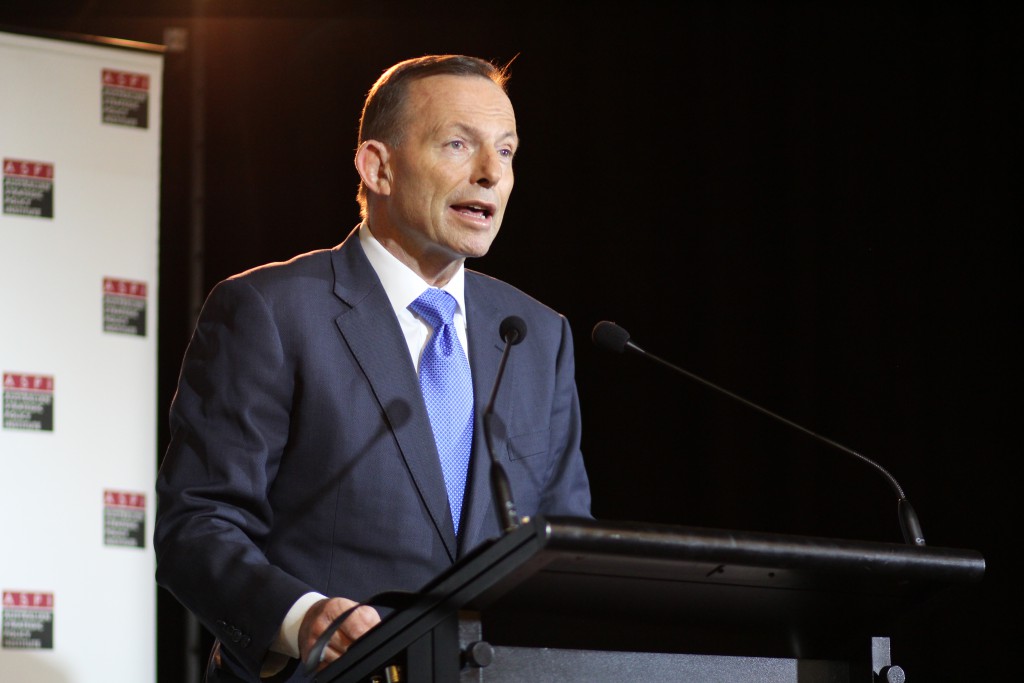 Tony Abbott today set the course for future government policy on naval shipbuilding in Australia. In his speech to ASPI’s Future Force Structure Options for Army Conference, the Prime Minister committed the government to a continuous build program for the next generation RAN frigates:
Tony Abbott today set the course for future government policy on naval shipbuilding in Australia. In his speech to ASPI’s Future Force Structure Options for Army Conference, the Prime Minister committed the government to a continuous build program for the next generation RAN frigates:
It is the government’s intention to develop a continuous build of major surface warships here in Australia to avoid the unproductive on-again, off-again cycle that has done this industry so much damage.
He took the opportunity to flag policy announcements over the coming weeks on naval warship construction. The competitive evaluation process (CEP) for the next generation submarines is due to be completed by late-November 2015, with three contenders in Japan, Germany and France vying for the contract worth up to $50 billion.
Conspicuously, while the Prime Minister spoke of the CEP for the future submarine project, he gave no comfort to those who favour a wholly local build for the boats.
It is certainly not necessary or practical that all our defence equipment be made here in Australia but it is necessary that it be sustainable in Australia.
That said, our preference will always be for local build where world class equipment can be obtained at a reasonable price in a way that doesn’t limit interoperability with our allies.
Mr Abbott said there would be work on combat systems for the new boats as well as long-term sustainment work in Adelaide. The forthcoming Defence White Paper is expected to confirm that at least eight next generation boats will be ordered.
Obviously, we want to maximise Australian involvement in its build, including work on combat systems integration, and this will result in the creation of at least 500 new highly skilled jobs.
While the Prime Minister expressed reservations about ‘very significant cost blowouts and very significant delays’ in the air warfare destroyer program, he cited the ANZAC frigate program and Austal’s work for the US Navy in support for the government’s continuous build strategy.
The government’s shipbuilding plan is expected sometime in July, and will set the direction for construction of the RAN’s future frigates. Decisions involving the future ownership of Adelaide-based ASC are also expected in the coming weeks. ASC will remain the hub of naval construction in Australia.
The Prime Minister also used the occasion to re-commit the government to raising defence spending to 2% of GDP by 2024:
At a time when the armed forces of like-minded nations are facing cuts, Australia is boosting defence spending to almost $32 billion next year and $132 billion over the forward estimates.
That is an increase of almost $10 billion compared with the four-year estimates announced in last year’s Budget.
Mr Abbott promised that the forthcoming Defence White Paper wouldn’t be ‘an unfunded wish list,’ but rather that ‘it will be a costed, sustainable, long-term plan’:
We’ve listened to the experts from defence, from our intelligence services, from industry, academia, think tanks and broader government.
All the big projects and programmes in the portfolio have been assessed by industry analysts.
For the first time, there has been an externally validated assessment of defence costs so that we can be more confident that defence spending is finally value for money.
The Prime Minister said the upcoming White Paper, together with the Defence Investment Plan, Defence Industry Policy Statement, and the Naval Shipbuilding Plan would determine the shape of the future army, navy and air force with a sharp focus on interoperability:
…succeeding in the future will depend on more than high-end capabilities.
It’s the integration and the sharing of information between platforms and systems that will make our armed forces truly interoperable and allow us to maintain an edge in our region.
Properly knitted together, these capabilities will be more than the sum of their parts and will ensure a more mobile, agile, adaptable, and potent Australian Defence Force.
Mr Abbott said the ADF should not only be capable of mounting independent combat operations anywhere close to home but able contribute to coalition military operations around the globe: ‘We owe it to those in uniform, we owe it to our country and to our citizens, we owe it to the wider world in which we are a force for good to ensure that our armed forces are becoming more potent and more capable all the time.’

